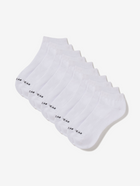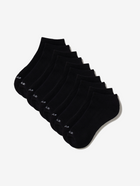Fashion is undergoing a transformation, and at the forefront of this revolution is sustainability. As sustainability and style converge to shape the future of the fashion industry, Allwear strives to help lead change.
In this exploration, we'll unveil the essence of Allwear's mission, showcase the diverse range of eco-friendly materials we employ, and delve into the environmental impact of our collection, reaffirming our commitment to a better fashion future.
Synthetic Fabrics and Their Environmental Consequences
In our pursuit of style and comfort, we often overlook the environmental toll of synthetic fabrics, from microplastic pollution to chemical usage and resource depletion.
Microplastic Pollution
Synthetic fabrics are stealthily contributing to one of the planet's most concerning environmental challenges: microplastic pollution. These tiny plastic fibers shed from synthetic clothing during washing end up in our waterways, oceans, and even our food chain.
Chemical Usage
The environmental footprint of synthetic fabric production extends beyond the finished product. Behind the scenes, a cocktail of chemicals is used in the manufacturing process, from dyes to finishing treatments.
Resource Depletion
The synthetic fabric industry heavily relies on petrochemicals derived from fossil fuels. This reliance not only contributes to greenhouse gas emissions but also depletes finite resources.
The Human Cost of Synthetic Fabrics
Health Concerns: Unmasking Potential Risks
Synthetic fabrics such as the most common polyester and nylon, with their allure of convenience and affordability, have generated growing concerns about potential health risks. These concerns are not to be taken lightly, as the materials we wear can have a profound impact on our well-being.
Skin Irritations: Synthetic fabrics often lack breathability, leading to increased perspiration and a higher likelihood of skin irritations.
Allergic Reactions: Synthetic textiles have been linked to allergic reactions due to the chemical additives used in their production.
Long-Term Health Impacts: Beyond immediate reactions, we will explore the emerging scientific research on the long-term health effects of prolonged exposure to synthetic fabrics.
Worker Conditions: Laboring in the Shadows
The synthetic fabric and fast fashion industry relies on a global workforce that often toils in the shadows of the fashion world. While consumers enjoy the benefits of affordable clothing, the human cost of production is rarely acknowledged. In this section, we will uncover the challenging labor conditions faced by workers in this industry.
Meager Wages: Many of the workers in synthetic fabric production earn wages that are far below living standards.
Substandard Working Environments: Workers in synthetic fabric factories often face hazardous conditions, from inadequate ventilation to exposure to harmful chemicals.
Limited Labor Rights: Labor rights violations are prevalent in the industry, with workers often denied basic rights such as collective bargaining and safe working conditions.
The Transition to Natural Fabrics: A Sustainable Fashion Future
The Resurgence of Natural Fabrics: Embracing Eco-Friendly Textiles
As the environmental and health consciousness of both consumers and the fashion industry grows, there has been a remarkable resurgence of interest in natural fabrics. In this section, we delve into the factors driving this shift towards eco-friendly textiles and their significance in shaping the future of fashion.
Consumer Awareness
Consumers are increasingly aware of the environmental and ethical consequences of synthetic materials. This renewed interest in natural fabrics stems from heightened consumer awareness campaigns, documentaries, and sustainability movements.
Innovations in Textile Technology
Advancements in textile technology have made natural fabrics more accessible. Innovative blends and sustainable dyeing processes have propelled the resurgence of these materials.
Environmental Benefits: Natural Fabrics as Earth-Friendly Solutions
Natural fabrics offer a myriad of environmental benefits that can significantly reduce the fashion industry's impact on the planet. In this section, we emphasize these advantages and underscore the role of natural fabrics in creating a more sustainable fashion future.
Biodegradability
Natural fabrics biodegrade naturally over time, in stark contrast to synthetic materials that persist in landfills for centuries. This inherent biodegradability contributes to a reduction in textile waste.
Reduced Water Usage in Cultivation
Natural fabrics, such as organic cotton, require significantly less water during cultivation compared to synthetic counterparts. These textiles conserve precious water resources.
Lower Energy Consumption in Production
Production processes for natural fabrics are typically less energy-intensive than those for synthetic materials. This translates to a reduced carbon footprint in fashion production.
Impact on Greenhouse Gas Emissions
The fashion industry's carbon emissions can be lowered by shifting towards organic cotton, and Tencel. This transition has the potential to reduce greenhouse gas emissions associated with fashion.
Eco-Conscious Fashion: Allwear's Sustainable Mission
Allwear is not just a fashion brand; it's a movement towards a more sustainable future. Our mission is to redefine the way we perceive clothing, emphasizing sustainability, style, and inclusivity.
Inclusivity
Allwear believes that sustainable fashion should be for everyone, regardless of size, shape, or gender. We provide a wide range of sizes, from XXS to 7XL, to ensure that every individual has access to stylish and sustainable clothing.
Eco-Friendly Materials
Our commitment to sustainability is woven into every garment we create. We prioritize natural materials, including organic cotton, Tencel, and bamboo, to reduce the ecological impact of our products and keep you away from highly synthetic polyester and nylon.
Versatile Wardrobe
Allwear promotes a simplified wardrobe concept. We believe that you can do more with less, so we offer versatile pieces that can be mixed and matched, creating a functional on-the-go capsule wardrobe that requires fewer items and reduces clothing waste.
Minimalism and Timelessness
Our designs focus on minimalism and timelessness. We reject the fast fashion mentality and create pieces that endure through changing trends. This approach extends the lifecycle of our products and reduces the need for frequent replacements.
Final Thoughts on the Future of Fashion
In conclusion, Allwear was created with the unwavering commitment to sustainable and stylish fashion for your on-the-go lifestyle. With our inclusive sizing, eco-friendly materials, and versatile designs, we aim to provide you with the tools to create a wardrobe that takes the stress out of getting dressed. Join us in reshaping the fashion industry for a better future.



